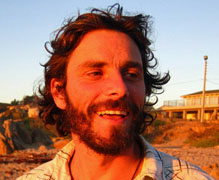Global Greengrants Fund is made up of an international network of environmental activists and experts. To learn more about and the issues we’re focusing on each month and the people directing your donations, we decided to ask our experts a few questions.
Because we’re focusing on marine issues and artisinal fisheries for the month of September, we contacted our advisor, Stefan Gelcich, a marine biologist whose work has been featured in the Proceedings of the National Academy of Sciences (PNAS). Here, he schools us on grassroots efforts to conserve marine ecosystems.

Stefan Gelcich: Directing Grants in Chilé around Marine Issues
To learn more about Stefan and the work he is doing, check out his full bio.
Q: What are the biggest challenges around marine conservation both locally and globally?
A: There are many big challenges for ocean conservation which range from overfishing to climate change. However, in my opinion, one of the biggest challenges is to integrate sustainable use and conservation in innovative, participatory manners in order to achieve ocean stewardship. Within this context, the management of small scale and artisanal fisheries play a fundamental role. Grassroots initiatives, which can be triggered with small funds, can make a real difference.
Q: How is Global Greengrants Fund supporting work around marine issues and artisanal fishing?
A: Global Greengrants is supporting grassroots movements to find their own solutions in order to manage and conserve marine ecosystems.
In Chile, Global Greengrants has helped local fishermen and municipalities develop and engage in marine conservation in a joint manner. With the help of a small grant, fishermen, academics, and government officials were allowed to share common experiences and develop the necessary skills to create a local conservation model. Although this model is informal, research has shown that increased participation and management delegation to local communities has indeed changed environmental attitudes in a favorable manner and protected coastal biodiversity.
Small marine conservation movements also have important spinoffs, and it is common for pilot projects to act as learning platforms, which are then linked at multiple levels and across to other groups. In essence, I am optimistic that some portion of the ocean crisis in coastal marine areas can be successfully tackled through small initiatives which support fishermen and local residents’ innovative capacity.
Q: What successes or changes have you seen thus far?
A: I have seen how a group of artisanal fishers has become empowered and has changed their harvesting decisions by being involved in community conservation projects. It is heartening to see how they have stood up against global market pressures and decided to harvest collectively and sustainably. In general, I have seen that the key aspect for ocean stewardship is to acknowledge that there are no fixed recipes, and thus, it is fundamental to develop conservation practices within local contexts in innovative and creative ways. Global Greengrants Fund allows a way to support these types of bottom-up conservation strategies.
It is critical that we support locally-based approaches. They have global implications for the sustainability and conservation of our oceans.
